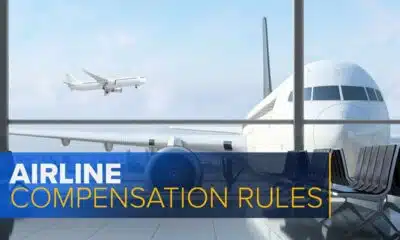News from the South - Florida News Feed
Investigation underway after boat explosion injures 11 in Fort Lauderdale
SUMMARY: A flash fire exploded aboard a 39-foot Sea Ray boat in Fort Lauderdale on Memorial Day, injuring 11 people, including two children. The incident, believed to have been caused by ignited fuel vapors, sent passengers overboard, with several sustaining serious burns. Emergency crews quickly responded, treating adults and children on-site. Investigators from Florida Wildlife Commission (FWC) and Fort Lauderdale Fire Rescue are examining the cause, unloading items from the boat, which remains on scene due to low tide delaying towing. All injured individuals are expected to recover, though some may face longer healing periods.
CBS News Miami ‘s Ted Scouten reports from Fort Lauderdale, where a boat explosion injured 11 people, including 2 children.
News from the South - Florida News Feed
Legal aid group sues to preemptively block U.S. from deporting a dozen Honduran children
SUMMARY: A legal aid group, the Florence Immigrant & Refugee Rights Project (FIRRP), has sued to block the U.S. government from deporting 12 Honduran children, citing “credible” information about imminent removal plans. This lawsuit amends a recent case that temporarily halted the deportation of Guatemalan migrant children. FIRRP fears these actions violate the children’s rights to seek protection in the U.S. The Trump administration previously attempted to deport Guatemalan children, prompting legal challenges and a federal judge’s intervention. The lawsuit demands these children access immigration judges, legal counsel, and placement in settings best for their welfare.
The post Legal aid group sues to preemptively block U.S. from deporting a dozen Honduran children appeared first on www.news4jax.com
News from the South - Florida News Feed
‘Deportation Depot’ begins operations outside Jacksonville
SUMMARY: Florida has opened its second migrant detention center, the “Deportation Depot,” at Baker Correctional Institution near Jacksonville, holding 117 detainees with capacity for up to 1,500. This expansion follows a federal appeals court’s decision to keep the first facility, “Alligator Alcatraz,” operational despite legal challenges. Governor Ron DeSantis praised both centers as key to his immigration enforcement agenda, with plans for a third facility underway. Staffed by the National Guard and funded by a $600 million federal grant, the new site aims to address what DeSantis calls an immigration crisis. Critics warn of overcrowding and poor conditions, echoing concerns from the Everglades facility.
Read the full article
The post ‘Deportation Depot’ begins operations outside Jacksonville appeared first on www.tampabay28.com
News from the South - Florida News Feed
Deported Venezuelan mothers ask Melania Trump to help reunite them with their children
SUMMARY: María Alejandra Rubio, separated from her 8-year-old son during U.S. deportation proceedings, is among Venezuelan mothers appealing to U.S. First Lady Melania Trump to reunite families split by immigration policies. Rubio expected to return to Venezuela with her son but was deported alone; her son remains in Georgia with a family friend. The group, supported by Venezuela’s government, sent a letter urging Trump to halt child-parent separations and deport families together. Venezuela has accepted over 10,000 deportees this year after President Maduro ended his refusal to accept U.S. deportees. The U.S. stresses careful assessment before returning unaccompanied minors.
Read the full article
The post Deported Venezuelan mothers ask Melania Trump to help reunite them with their children appeared first on www.news4jax.com
-
Mississippi Today6 days ago
DEI, campus culture wars spark early battle between likely GOP rivals for governor in Mississippi
-
News from the South - Louisiana News Feed5 days ago
‘They broke us down’: New Orleans teachers, fired after Katrina, reflect on lives upended
-
News from the South - Alabama News Feed6 days ago
Alabama state grocery tax to fall 1% on Monday
-
Mississippi Today4 days ago
Trump proposed getting rid of FEMA, but his review council seems focused on reforming the agency
-
News from the South - Missouri News Feed5 days ago
Missouri joins dozens of states in eliminating ‘luxury’ tax on diapers, period products
-
News from the South - Tennessee News Feed4 days ago
Tennessee ranks near the top for ICE arrests
-
News from the South - South Carolina News Feed6 days ago
Warm and Mainly Dry Labor Day
-
News from the South - Alabama News Feed5 days ago
Alabama union leaders say they’re fighting for the state’s middle class










































